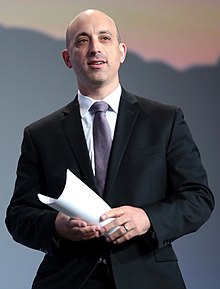Jonathan Greenblatt
Appearance

Jonathan Greenblatt (born November 21, 1970) is an American entrepreneur, corporate executive, and the sixth National Director and CEO of the Anti-Defamation League (ADL), a Jewish non-governmental organization focused on combating antisemitism. Prior to heading the ADL, Greenblatt served in the White House as Special Assistant to Barack Obama and Director of the Office of Social Innovation and Civic Participation.
Quotes
[edit]
- I believe that you call people in before you call them out. And I don't believe in cancel culture, I believe in counsel culture.
- The Breakfast Club (December 7, 2022).
- I have gone after Tucker Carlson, Marjorie Taylor Greene, Donald Trump, plenty of other people on the right who are white. I have gone after plenty of people on the left who are white. I have gone after—I shouldn't say "gone after", but called out people like Candace Owens, and people like Kanye [West], and others.
- The Breakfast Club (December 7, 2022).
- I think about Meyers Leonard last year, two years ago. Meyers Leonard, you know, he was a forward for The Heat who was caught. He was streaming on Steam playing, like, I cannot remember what game he was playing, and he used a pretty offensive term towards Jews. I think it was, like, Call of Duty. And we called him out. The Heat dropped him. He hasn't been picked up by another team. So he pretty much got cancelled. By the way, we've worked with Meyers over the years. We worked with him right away after that. He's done some good stuff with us calling out hate on video games since then. … He lost his whole career.
- The Breakfast Club (December 7, 2022).
- The insidious nature of antisemitism, and these tropes about power, is Kanye [West] can say these things—"Jews have all the power, they are controlling everything"—and if we don't get him, you know, if we don't deal with that, the myth spreads, and it takes root. If we do address that, and there are consequences, he says: "Aha! Proves my point." So it's kind of a "damned if you do, damned if you don't" scenario, and we're kind of stuck. We can't ignore it, because it has, again, consequences, and if it gets addressed, he says: "See? Proves my point." But, I mean, that's just the insidious and ugly nature of antisemitism.
- The Breakfast Club (December 7, 2022).
It Could Happen Here: Why America Is Tipping from Hate to the Unthinkable—and How We Can Stop It (2022)
[edit]- Every hateful thought or deed matters—not just because of the direct harm it causes to others, but because of the indirect role it plays as a vector for the spread of hate. Horrific attacks such as the one that took place at the Tree of Life synagogue don't just happen out of nowhere. They happen because over time, biased thinking and disrespectful behavior become normalized, leading larger numbers of people to demonize, dehumanize, and diminish the outsider.
- The FBI, for instance, includes "feeling alone or lacking meaning and purpose in life," "being emotionally upset after a stressful event," "not feeling valued or appreciated by society," and "believing they have limited chances to succeed" as among the factors that make people vulnerable to radicalization. Research has suggested that extremists have higher rates of childhood trauma than members of the general population.

- Our society is becoming more vulnerable by the day to hate on both the left and the right. Beset by a pandemic that has devasted communities, unsettled everyday life, and cost millions of jobs, people are on edge, ever more likely to blame the Other, whether it's Jews, immigrants, Blacks, Asians, Latinx, Muslims, members of the LGBTQ community—you name it. Deepening economic inequality magnifies the tension, as does inadequate health care, excessive levels of personal debt, and stresses caused by once-in-a-century natural disasters that now occur every year. In this environment, with hatred seething around us, the arrival of another demagogue—one smarter and more disciplined than Donald Trump—is all it would take to produce an explosion of violence, mass death, and the destruction of our society and democracy.
- My former boss Barack Obama likes to invoke a teaching of Martin Luther King Jr.: "The arc of the moral universe is long, but it bends toward justice." It sounds nice but it's not quite true. The arc can bend toward justice, but much of the time it tacks stubbornly toward the status quo. We must be willing to do the work, reaching up with our own hands and wrenching the arc away from stasis and toward a better future. And when the arc seems to be bending away from justice, we have to dig deep, muster even greater resources, and bend it back.

